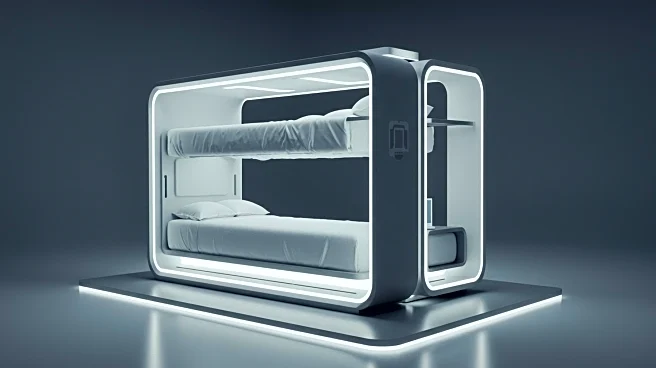What's Happening?
The Europe room cell module market is anticipated to grow significantly, with projections indicating an increase from $12.14 billion in 2025 to $17.28 billion by 2032. This growth is driven by the rising adoption of modular construction techniques across various sectors, including residential, hospitality, and education. Modular solutions are favored for their ability to reduce construction timelines by up to 50%, enhance cost efficiency, and meet sustainability standards. Steel frame modules are expected to lead the market due to their strength and adaptability, particularly in high-rise buildings. The residential sector is predicted to dominate, accounting for 56% of the market, fueled by demand for student housing and affordable homes. Germany is expected to hold a significant market share, supported by technological advancements and government-backed sustainability initiatives.
Why It's Important?
The expansion of the room cell module market in Europe highlights a shift towards more sustainable and efficient construction methods. Modular construction offers significant advantages, including reduced labor needs, minimized material waste, and higher quality through controlled factory environments. This trend is particularly important in addressing urbanization challenges and housing shortages, especially in multi-family and student housing projects. The integration of smart technologies and innovations in Building Information Modeling (BIM) further enhances the appeal of modular methods. As governments incentivize sustainable building practices, the demand for modular solutions is likely to increase, benefiting developers and construction firms that adopt these methods.
What's Next?
The market is expected to continue its growth trajectory, with Germany and the UK leading regional expansion. The adoption of factory-built modular bathrooms in hotels and dormitories is anticipated to rise. As green building certifications and EU sustainability goals tighten, manufacturers focusing on low-carbon, energy-efficient modules will gain a competitive edge. The hospitality and healthcare sectors present significant untapped potential for modular adoption. Companies are likely to invest in specialized advancements such as robotic manufacturing and 3D printing to meet unique architectural requirements and enhance their market position.
Beyond the Headlines
The growing popularity of modular construction in Europe could lead to long-term shifts in the construction industry, emphasizing sustainability and efficiency. The perception barriers associated with modular methods may gradually diminish as more developers recognize their benefits. Regulatory variations across European countries could pose challenges, but efforts towards standardization may facilitate cross-border adoption. The focus on eco-friendly modular solutions aligns with broader environmental goals, potentially influencing construction practices globally.









